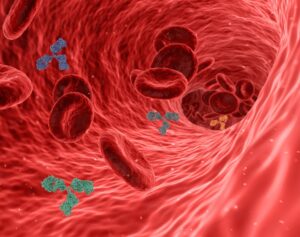Do you suffer with from frequent or severe abdominal pain, constipation, diarrhea, or digestive issues? Think you suffer from inflammatory bowel disease, ulcerative colitis or Crohn’s disease? You are not alone, there are over 30,000 new cases of inflammatory bowel disease (IBD) being diagnosed each year.
What is the difference between inflammatory bowel disease, ulcerative colitis, and Crohn’s disease?
Both ulcerative colitis and Crohn’s disease are considered to be common types of inflammatory bowel disease. The difference between them is where the inflammation takes place within the digestive system and how deep the inflammation occurs in the layers of the gut.
What areas within the digestive system is affected?
 Ulcerative colitis affects the colon or large intestine. The lining of the colon becomes inflamed, leading to blood in the stool, diarrhea, urgency, weight loss, and abdominal pain, among other issues.
Ulcerative colitis affects the colon or large intestine. The lining of the colon becomes inflamed, leading to blood in the stool, diarrhea, urgency, weight loss, and abdominal pain, among other issues.
Crohn’s disease can affect anywhere from the mouth to the anus, the entire digestive tract. It can also involve the surrounding connective tissue by penetrating through the intestinal wall. This can lead to complications such as stricture (narrowing of the intestine), fistula (abnormal connections form to the bowel and other structures), and abscess formation.
Ulcerative colitis is continuous inflammation of the colon. With Crohn’s disease, inflamed areas of the intestine can be mixed with healthy parts.
What causes inflammatory bowel disease?
The exact causes of IBD are not known, the genetic factors are very complex. According to Health Matters, New York Presbyterian, “Whereas family history is the most significant risk factor, inheritance is not straightforward. Changes in the intestinal microbiome, which is the collective microorganisms and their metabolic products within the intestine, are a hallmark of IBD. These changes have the potential to activate abnormal immune pathways in patients with a genetic predisposition.”
The article goes on to say, “Once the immune system is activated, the body cannot turn off this pro-inflammatory circuit. Therefore, the immune system can no longer perform its protective function and the dysregulated immune activation leads to ongoing inflammation.”
Other factors include medications, antibiotics, gastrointestinal infection, dietary additives, cigarette smoking, and others
Symptoms of Crohn’s disease
Symptoms vary with Crohn’s disease, the most common are diarrhea, abdominal pain, and weight loss. Less frequent symptoms are blood in stools, abdominal bloating, fever, constipation.
Symptoms of Ulcerative colitis
Symptoms of ulcerative colitis can be similar to Crohn’s disease, diarrhea, abdominal pain, mucus in the stool, fatigue, and weight loss.
Recently there have been advances in the understanding and treatment of the irritable bowel disease, including Crohn’s disease and ulcerative colitis
Here at Gastroenterology Consultants of Central Florida, we specialize in the care of patients with inflammatory bowel disease, including ulcerative colitis and Crohn’s disease. We take a multidisciplinary approach to patient care, which is associated with improved quality of life and a higher treatment success rate, for those living with IBD.
We have a clinical research team here in the office doing studies on up and coming medications for these diseases.
If you have any questions or concerns about irritable bowel disease, please contact Gastroenterology Consultants of Central Florida.
